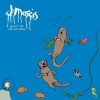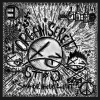Gig Reviews

Thy Catafalque
Stengade, Copenhagen, DEN - 6/4
Album Reviews

Say Anything
Hebrews
Written by: TL on 09/08/2014 00:27:45
Finding the band at the receiving end of a sort of cult worship already at second album "... Is a Real Boy", Say Anything - and more essentially main man Max Bemis - has made a trail from achievement to achievement, though arguably peaking with the self-titled fourth album from 2009 which showcased some of the most outstanding punk-pop songwriting comitted to bits in the digital age. Stepping back from Sony to indie label Equal Vision with 2012's "Anarchy, My Dear" however, it sounded a bit like Say Anything had tried to recycle the previous approach with less pristine results, and as such it is perhaps not a surprise that the new "Hebrews" sees things shaken up and then some: With the entire ever-changing line-up behind Bemis getting benched, this year's Say Anything record made waves ahead of its arrival by declaring to omit guitars entirely and instead rely on programmed orchestral instrumentation.
Surprisingly and somewhat comically however, the most remarkable characteristic of this "new sound" is that while it is indeed eclectic and vibrant with different nuances, it still takes a complete backseat to Bemis' vocals and lyrics. Granted, you could always say this of Say Anything, but it is perplexing how rarely Bemis shifts the focus to any particularly noteworthy arrangements on here, now that he has opted to go this route after all (the title track being the most noteworthy exception to this). Really though, it feels more like the challenge for him has been to see if he could create the band's usual melodious and frantic energy, only with keys and digital strings and bells and whistles instead of the normal band setup (and the drums even still play a relatively conventional rock role).
The full potential for an interesting dynamic between Bemis' lyrical poetry and an orchestral counterpart hence remains unrealised, and while we're at it, we might as well admit that the same is the case with at least half the throng of prominent guest vocalists. Take a deep breath please: From Saves The Day, The Get Up Kids, Balance And Composure, Los Campesinos, Every Time I Die, The Front Bottoms, Braid and Blink-182 - Chris Conley, Matt Pryor, Jon Simmons, Keith Buckley, Brian Sella, Bob Nanna, Tom Delonge and Gareth and Kim Campesinos appear in such limited harmony-singing roles that any half decent session singer could've easily done the same. Admittedly no one guest falls through in their assigned role, and you can't blame Bemis for bringing friends in instead of hired guns, but considering these names, I'd forgive any curious fans that find another aspect of under-utilized potential when glancing at the all star line-up.
What fortunately remains ever-interesting - albeit for better as well as worse - is Bemis' utterly neurotic lyrical universe, which is delivered front and centre via the bitter ex-New Yorker's agitated and strongly articulated, spat-out style. Inescapably caugt in a crossfire between his detractors and his own self-awareness, the now happily married father of one has no fewer issues nor any less bile to spew out with pen and tongue. This much is clear, yet as the direction of "Anarchy" hinted, the perenially cryptic Bemis is no longer as squarely in a position of sympathetic opposition, and the intentions of songs like the opening duo "John McClane" and "Six Six Six" get no clearer with a lyrics sheet in hand, passing by forgetably if it wasn't for a catchy pair of bridges towards their ends, best of which is the latter's appearance of Manchester Orchestra's Andy Hull, whose part makes its bid for one of the few remarkable guest-spots included.
Moving on, "Judas Decapitation" is another dive into Bemis' grapple with internet critics, and while the Campesinos come and go anonymously, it's clearest here that while the Bemis' of the past gave as good as he got - like a willing and fiery combatant - the Bemis of now seems tired of the whole thing, and gets increasingly self-righteous and dismissive in what sounds a bit like an effort to have the last word. Along with "A Look" and "Nibble Nibble", these form the regretably forgetable sections on the album that will likely cease from your awareness as quickly as they entered, no matter Bemis' solid grip of bouncy melodies and dynamic delivery.
Fortunately, there is at least half an album yet on which the songwriting does find its strongest form and reminds the attentive listener just how brilliant Bemis can be at his best. "Kall Me Kubrick" and "My Greatest Fear Is Splendid" are the lesser cuts here, the former tip-toeing between silly and funny with a comical horn sound and Bemis' exagerrated vision of his worst case future, and the latter awakening the orchestral arrangements with a fine shot of energy and lyrics of intoxicating yourself with tequila and red bull, although the slurred and repeated mispronunciation of "swastika" towards the end is something of an ear-sore. "Boyd" gets an honourable mention as well, for being relatably hilarious as it aggressively threatens an imagined future suitor for Bemis' infant daughter Lucy.
Heed those, yet for all that is holy do focus primarily on "Hebrews", "Push", "The Shape Of Love To Come" and "Lost My Touch". The feelings of angst and existential questions are perhaps more poignantly worded than ever in the former two, as Bemis struggles futilely in the role of a minority that is getting assimilated into an immoral culture and quivers with feelings of inadequacy ahead of the birth of his child. Yet directly afterwards the reconciliation and gritty commitment between him and his wife Sherri Dupree is heartbreaking in "The Shape Of Love To Come", and as the album nears its end, "Lost My Touch" seeks the high road, with sister-in-law Christie Dupree adding a feminine potential to Max's ironic instructions on how to make him obsolete while Touché Amoré's iconic Jeremy Bolm lends granite-like gravity to the send-off which at least tries to accept and embrace an inevitable decline in artistic relevance.
The question though, is whether a man of thirty can be taken very seriously when airing such considerations already. Bemis' certainly seems like he's hearing it from his critics that he's no good now that he's married and a parent, but as he proved occasionally on "Anarchy, My Dear", and does for a considerable part of "Hebrews", he's well capable of masterful songwriting when inspiration is flowing, and one wonders if the reasons it doesn't flow quite as unstoppably as on "Say Anything" aren't more elusive or banal, such as sheer lack of focus, perspective or just plain luck. Of course Bemis wouldn't be Bemis if he didn't find some malign tendency to lash out against, and indeed much of his appeal is owed to this, but realistically, the more likely road up to future superb records from his hand, I would suggest to be via a stricter song selection process and perhaps via shutting up for just a second here and there to let the instruments provide some more equal opposition.
Download: Hebrews, Push, The Shape Of Love To Come, Lost My Touch
For The Fans Of: Weatherbox, Motion City Soundtrack, Weezer, Piebald
Listen: facebook.com/sayanything
Release date 10.06.2014
Equal Vision
 Twitter
Twitter Facebook
Facebook












